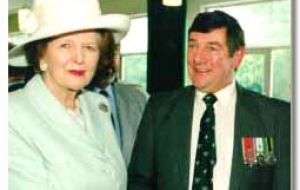MercoPress. South Atlantic News Agency
“A warrior taking his rest” Quiet funeral for Falklands' local hero
 Baroness Thatcher and Mr. Terry Peck MBE
Baroness Thatcher and Mr. Terry Peck MBE Flags flew at half-mast at all government buildings in the Falkland Islands today, Wednesday, as a mark of respect, for the funeral of Terry Peck, former Chief of Police, former Member of the Legislative Council and one of the genuinely local heroes of the 1982 war for the liberation of the islands from Argentine occupation.
An elected member of Legislative Council, the Falkland Islands parliament, from 1981 to 1984 and from 1989 to 1993, Terry Peck is remembered as being "very forceful" and whole-heartedly committed to a number of local causes, particularly the need for local workers to have equal opportunities with overseas contractors for employment in post war aid projects. "Whatever he did, he did it to the full" says, Ron Binnie, who was one of his fellow councillors. Prior to his burial in the Stanley cemetery, a group of some two hundred and fifty people, including the Governor of the Falklands, Mr Alan Huckle and Mrs Huckle, Councillors and representatives of the military establishment at Mount Pleasant, gathered at the Headquarters of the Falkland Islands Defence Force to drink a final toast to Terry Peck and to listen to eulogies from his son, the painter James Peck and his brother-in-law, local historian and former Curator of the Falkland Islands Museum, John Smith. James, whose celebrated paintings on the theme of the war in the Falklands so poignantly express the suffering and desolation of the individual soldiers, particularly the 'pibes' or conscripts of the Argentine forces, spoke of his father's concern for the ordinary people of the Falkland Islands, which was expressed throughout his various careers, as policeman, councillor and Manager of the YMCA. He believed, said James "in extending the hand of help whenever it was needed." and equally fiercely, in the rights of the common man. This theme of care, coupled at times to spontaneous and immediate action to put things right, was taken up by John Smith, who quoted former Falkland Islands Chief Executive, Ronnie Sampson as writing that Terry Peck "had left an indelible mark" on the history of the Falklands. John Smith commented also that at the time when Terry Peck was Chief of Police, for which service he was awarded the Colonial Police Medal, there had been no organised social welfare system in the Falklands and that much of what would now be considered social work had fallen to Terry, as head of a comparatively small police force. According to his brother-in law, Terry Peck had always demonstrated an uncanny knack for knowing what needed to be done and then doing it, never more so than in 1982. In the early days after the occupation of the Falklands by Argentine forces, Terry Peck re-enlisted as a Special Constable in the force he had once led and spent some time with a concealed camera taking photographs of the invaders' dispositions and equipment, which were later to be smuggled to the British forces. Later, having attracted the unwelcome attention of the notorious Major Patricio Dowling, the aggressively anti-British intelligence officer and under threat of arrest, on 21st April, Terry Peck found his way out of Stanley, with a borrowed weapon and a "liberated" motor bike, going first to Long Island, a farm to the North of Stanley, before spending a period of three weeks, living rough, keeping out of the way of Argentine patrols and making only spasmodic contact with friendly farmers, until the news of the British landings at San Carlos on 21st May reached him. With some trepidation that he might be shot, Terry Peck made his way to the British bridgehead, where instead of getting the good night's sleep he longed for, he faced a long period of debriefing, and then was asked to join up with the 3rd Parachute Regiment as part of D Patrol Company. Very soon he found himself once again very near to Stanley, engaged in perilous night-time reconnaissance of enemy positions, on some occasions , as he is quoted in the book Falkland Islanders at War, by Graham Bound, " We would get as close as we could without spitting in their eye. We're talking tens of metres."Eventually, as a result of intelligence gathered in this way, the British were ready to assault Mount Longdon on the night of 12th June. Farmers and other locals from the North of East Falklands helped the British move ammunition and equipment to the battle's 'start line' but only Terry Peck and fellow Islander Vernon Steen, also by now attached to 3 Para, continued on to take part in what was to be one of the hardest fought and bloodiest battles of the war. As a result of the traumatic experience of the battle for Mount Longdon, Terry Peck was later to suffer Post Traumatic Stress Disorder. Typically, he used his personal awareness of the mental anguish suffered by the combatants to motivate him to do something about their plight and was to devote much of the energies of his later years to the South Atlantic Medal Association, an organisation set up to provide care and support for British Falklands veterans When it was all over, Terry Peck received a medal, but despite the mental scarring he suffered in their company, his proudest moment came when the Parachute Regiment awarded him the coveted red beret, which today he took with him to his eternal rest. * Terry Peck, 68, died on Saturday after a relatively brief, but characteristically valiant fight against cancer. He is survived by his wife Eleanor and four adult children from his previous marriage. John Fowler (Mercopress) Stanley




Top Comments
Disclaimer & comment rulesCommenting for this story is now closed.
If you have a Facebook account, become a fan and comment on our Facebook Page!